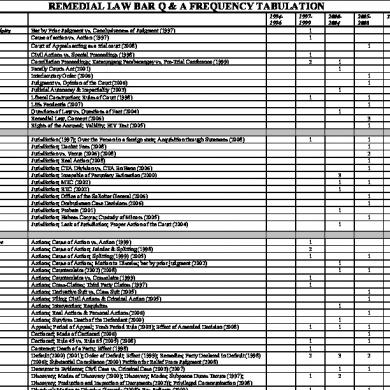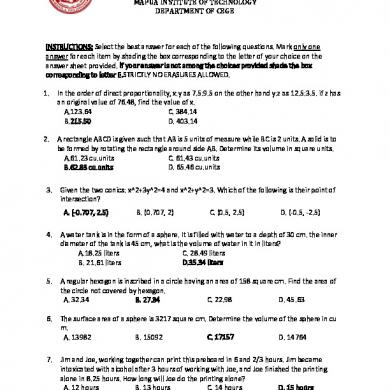Bar Q & A In Remedial Law
This document was uploaded by user and they confirmed that they have the permission to share it. If you are author or own the copyright of this book, please report to us by using this DMCA report form. Report DMCA
Overview
Download & View Bar Q & A In Remedial Law as PDF for free.
More details
- Words: 1,046
- Pages: 3
Loading documents preview...
BAR QUESTIONS AND ANSWERS IN REMEDIAL LAW 2000-2019 1. CTA Division vs. CTA En Banc (2006) Mark filed with the Bureau of Internal Revenue a complaint for refund of taxes paid, but it was not acted upon. So, he filed a similar complaint with the Court of Tax Appeals raffled to one of its Divisions. Mark's complaint was dismissed. Thus, he filed with the Court of Appeals a petition for certiorari under Rule 65. Does the Court of Appeals have jurisdiction over Mark's petition? (2.5%) SUGGESTED ANSWER: No. The procedure is governed by Sec. 11 of R. A.9282. Decisions of a division of the Court of Tax Appeals must be appealed to the Court of Tax Appeals en banc. Further, the CTA now has the same rank as the Court of Appeals and is no longer considered a quasi-judicial agency. It is likewise provided in the said law that the decisions of the CTA en banc are cognizable by the Supreme Court under Rule 45 of the 1997 Rules of Civil Procedure. 2. Incapable of Pecuniary Estimation (2003) A filed with the MTC of Manila an action for specific performance against B, a resident of Quezon City, to compel the latter to execute a deed of conveyance covering a parcel of land situated in Quezon City having an assessed value of p19,000.00. B received the summons and a copy of the Complaint on 02 January 2003. On 10 January 2003, B filed a Motion to Dismiss the Complaint on the ground of lack of jurisdiction contending that the subject matter of the suit was incapable of pecuniary estimation. The court denied the motion. In due time, B filed with the RTC a Petition for Certiorari praying that the said Order be set aside because the MTC had no jurisdiction over the case. 6%On 13 February 2003, A filed with the MTC a motion to declare B in default. The motion was opposed by Bon the ground that his Petition for Certiorari was still pending. (a) Was the denial of the Motion to Dismiss the Complaint correct? (b) Resolve the Motion to Declare the Defendant in Default. SUGGESTED ANSWER: (a) The denial of the Motion to Dismiss the Complaint was not correct. Although the assessed value of the parcel of land involved was P19,000.00, within the jurisdiction of the MTC of Manila, the action filed by A for Specific Performance against B to compel the latter to execute a Deed of Conveyance of said parcel of land was not capable of pecuniary estimation and, therefore, the action was within the jurisdiction of RTC. (Russel v. Vestil, 304 SCRA 738[1999]; Copioso v. Copioso, G.R. No. 149243, October28,2002; Cabutihan v. Landcenter Construction, 383SCRA 353 [2002]).
ALTERNATIVE ANSWER: If the action affects title to or possession of real property, then it is a real action and jurisdiction is determined by the assessed value of the property. It is within the jurisdiction therefore of the Metropolitan Trial Court. SUGGESTED ANSWER: (b) The Court could declare B in default because B did not obtain a writ of preliminary injunction or a temporary restraining order from the RTC prohibiting the judge from proceeding in the case during the pendency of the petition for certiorari. (Sec. 7 of Rule 65; Diaz v. Diaz, 331 SCRA 302 [2002] ALTERNATIVE ANSWER: The Court should not declare B in default in as much as the jurisdiction of MTC was put in issue in the Petition For Certiorari filed with the RTC. The MTC should defer further proceedings pending the result of such petition. (Eternal Gardens Memorial Park). 3. Jurisdiction; MTC (2002) P sued A and B in one complaint in the RTC-Manila, the cause of action against A being on an overdue promissory note for P300,000.00 and that against B being on an alleged balance of P300,000.00 on the purchase price of goods sold on credit. Does the RTC-Manila have jurisdiction over the case? Explain. (3%) SUGGESTED ANSWER: No, the RTC-Manila has no jurisdiction over the case. A and B could not be joined as defendants in one complaint because the right to relief against both defendants do not arise out of the same transaction or series of transactions and there is no common question of law or fact common to both. (Rule 3, sec. 6). Hence, separate complaints will have to be files and they would fall under the jurisdiction of the Metropolitan Trial Court. (Flores v. MallarePhilipps) 4. Subdivision Homeowner (2006) What court has jurisdiction over an action for specific performance filed by a subdivision homeowner against a subdivision developer? Choose the correct answer. Explain. a)
The Housing and Land Use Regulatory Board;
b)
The Securities and Exchange Commission;
c)
The Regional Trial Court; and
d) The Commercial Court or the Regional Trial Court designated by the Supreme Court to hear and decide "commercial cases."
SUGGESTED ANSWER: An action for specific performance by a subdivision homeowner against a subdivision developer is within the jurisdiction of the Housing and Land Use Regulatory Board. Sec. 1 of P.D. 1344 provides that the HLURB has jurisdiction over cases involving specific performance of contractual and statutory obligations filed by buyers of subdivision lots and condominium units against the owner, developer, dealer, broker or salesman. (Manila Bankers Life Insurance Corp. vs. Eddy Ng Kok Wei, G.R. No. 139791, December 12, 2003; Kakilala v. Faraon, G.R. No. 143233, October 18, 2004; Sec. 1, P.D. 1344) 5. Jurisdiction; RTC (2002) P sued A in the RTC-Manila to recover the following sums: (1) P200,000.00 on an overdue promissory note, (2) P80,000.00 on the purchase price of a computer, (3) P150,000.00 for damages to his car and (4) P100,000.00 for attorney’s fees and litigation expenses. Can A move to dismiss the case on the ground that the court has no jurisdiction over the subject matter? Explain. (2%) SUGGESTED ANSWER: No, because the RTC-Manila has jurisdiction over the subject matter. P may sue A in one complaint asserting as many causes of action as he may have and since all the claims are principally for recovery of money, the aggregate amount claimed shall be the test of jurisdiction. [Rule 2, sec. 5(d)]. The aggregate amount claimed is P450,000.00, exclusive of the amount ofP100,000.00 for attorney’s fees and expenses of litigation. Hence, the RTC-Manila has jurisdiction
ALTERNATIVE ANSWER: If the action affects title to or possession of real property, then it is a real action and jurisdiction is determined by the assessed value of the property. It is within the jurisdiction therefore of the Metropolitan Trial Court. SUGGESTED ANSWER: (b) The Court could declare B in default because B did not obtain a writ of preliminary injunction or a temporary restraining order from the RTC prohibiting the judge from proceeding in the case during the pendency of the petition for certiorari. (Sec. 7 of Rule 65; Diaz v. Diaz, 331 SCRA 302 [2002] ALTERNATIVE ANSWER: The Court should not declare B in default in as much as the jurisdiction of MTC was put in issue in the Petition For Certiorari filed with the RTC. The MTC should defer further proceedings pending the result of such petition. (Eternal Gardens Memorial Park). 3. Jurisdiction; MTC (2002) P sued A and B in one complaint in the RTC-Manila, the cause of action against A being on an overdue promissory note for P300,000.00 and that against B being on an alleged balance of P300,000.00 on the purchase price of goods sold on credit. Does the RTC-Manila have jurisdiction over the case? Explain. (3%) SUGGESTED ANSWER: No, the RTC-Manila has no jurisdiction over the case. A and B could not be joined as defendants in one complaint because the right to relief against both defendants do not arise out of the same transaction or series of transactions and there is no common question of law or fact common to both. (Rule 3, sec. 6). Hence, separate complaints will have to be files and they would fall under the jurisdiction of the Metropolitan Trial Court. (Flores v. MallarePhilipps) 4. Subdivision Homeowner (2006) What court has jurisdiction over an action for specific performance filed by a subdivision homeowner against a subdivision developer? Choose the correct answer. Explain. a)
The Housing and Land Use Regulatory Board;
b)
The Securities and Exchange Commission;
c)
The Regional Trial Court; and
d) The Commercial Court or the Regional Trial Court designated by the Supreme Court to hear and decide "commercial cases."
SUGGESTED ANSWER: An action for specific performance by a subdivision homeowner against a subdivision developer is within the jurisdiction of the Housing and Land Use Regulatory Board. Sec. 1 of P.D. 1344 provides that the HLURB has jurisdiction over cases involving specific performance of contractual and statutory obligations filed by buyers of subdivision lots and condominium units against the owner, developer, dealer, broker or salesman. (Manila Bankers Life Insurance Corp. vs. Eddy Ng Kok Wei, G.R. No. 139791, December 12, 2003; Kakilala v. Faraon, G.R. No. 143233, October 18, 2004; Sec. 1, P.D. 1344) 5. Jurisdiction; RTC (2002) P sued A in the RTC-Manila to recover the following sums: (1) P200,000.00 on an overdue promissory note, (2) P80,000.00 on the purchase price of a computer, (3) P150,000.00 for damages to his car and (4) P100,000.00 for attorney’s fees and litigation expenses. Can A move to dismiss the case on the ground that the court has no jurisdiction over the subject matter? Explain. (2%) SUGGESTED ANSWER: No, because the RTC-Manila has jurisdiction over the subject matter. P may sue A in one complaint asserting as many causes of action as he may have and since all the claims are principally for recovery of money, the aggregate amount claimed shall be the test of jurisdiction. [Rule 2, sec. 5(d)]. The aggregate amount claimed is P450,000.00, exclusive of the amount ofP100,000.00 for attorney’s fees and expenses of litigation. Hence, the RTC-Manila has jurisdiction
Related Documents

Bar Q & A In Remedial Law
January 2021 3
Remedial Law Bar Notes
March 2021 0
Remedial Law - Faqs For Bar
March 2021 0
2015 Bar Exam Questions In Remedial Law
February 2021 0
Labor Law 2019 Bar Q And A
February 2021 1
Crim Law 2015 Bar Q And A
January 2021 1More Documents from "Maria Beth"

Bar Q & A In Remedial Law
January 2021 3
437 Fitness Plan
February 2021 0
Dwells God - Kordero Ng Diyos
February 2021 2
Math Reviewer
March 2021 0
Etap Knowledge Base: Transformer Losses
January 2021 1